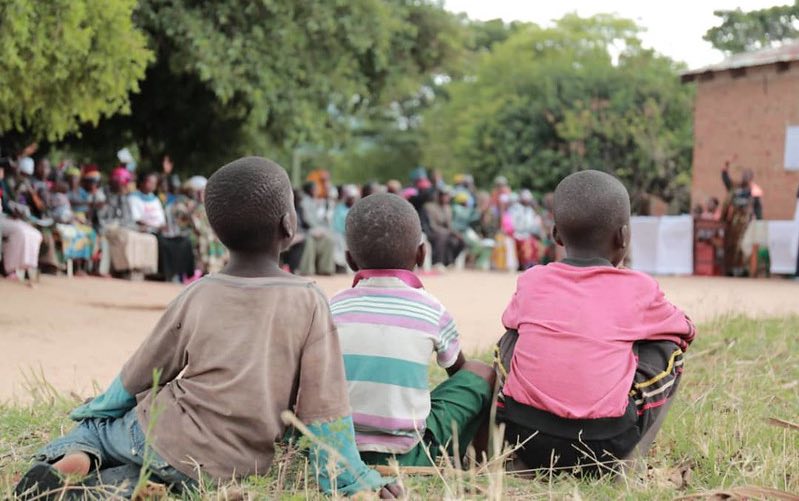The growing threat that climate shocks pose to food, water and nutrition security makes understanding the linkages between climate and nutrition increasingly urgent. Our new paper in Food Security demonstrates an empirical connection between rising temperatures, cereal yields, and poorer growth outcomes for children—the first time such a link has been established between climate shocks, agricultural productivity, and health.
We find that extreme temperature shocks can severely reduce maize yields, and that lower yields in the season prior to birth are a strong predictor of reduced height in later years, especially among boys. We also show that lower maize yields are predictive of lower body mass among women but not predictive of diarrhea or fever incidence in children. Taken together, these results suggest that maternal malnutrition during pregnancy is a key pathway linking heat shocks and agricultural production to subsequent child health.
The findings have important implications for policymakers responding to climate impacts, who must weigh whether to focus more on agricultural interventions and social protection or on public health interventions. Our research suggests the first approach could be particularly important in rural Africa.
Agriculture-related nutritional risks pose especially serious problems in Africa, where temperature is projected to rise faster than the global average. Millions of African farm households depend on rainfed agriculture and livestock, and some of our previous research shows that child stunting rates are much higher among Africa’s agricultural households than they are among other livelihood groups—suggesting that climate shocks that impact child nutrition could have important negative effects on human capital for years to come. The focus of our research, Tanzania, is a case in point: This maize-dependent country has already experienced dramatic heat shocks, with an increase in annual mean temperature from 22.7°C to 23.7 °C between 2000 and 2015, and that trend is likely to continue.
Our analysis used data on maize yields, child height and other household data from three rounds of the nationally representative Tanzania National Panel Survey (2008/09, 2010/11 and 2012/13), which we linked to current and lagged rainfall and temperature data. We used temperature data to measure “growing degree days” (GDD): The number of days in the growing season in which mean daily temperature is within the useful range for maize growth. Prior research shows a critical threshold of 29°C: above that level maize yields start to decline precipitously.
In the first stage of our research we corroborated this well-known threshold effect with regressions of maize yields against growing degree days, rainfall and other contorls: Substituting one full day at 39°C for a day at 29°C reduced predicted yield for the entire growing season by 6%–11%. In the second stage, we linked maize yields in the season prior to birth to child height observed at a later period, since child growth is a cumulative process. We found that in utero exposure to more growing degree days warmer than 29°C predicted lower height-for-age scores for children aged 0–5 years. Interestingly, though, the effect was far more pronounced for boys, a finding consistent with male fetuses being more vulnerable to in utero nutritional insults, as many medical studies document. We also found that women’s body mass declined with falling maize yields, providing further evidence that prenatal malnutrition is the mechanism that links heat shocks to child growth.
With the available data, we do not have direct observations of maternal nutrition during pregnancy. But our hypothesis is that yield shocks adversely affect both household maize supply and income, leading to deteriorations in diet. Prior research has established that maternal nutrition during pregnancy is a key determinant of child birth weight, and that low birth weight is a critical risk factor for later stunting.
Our research therefore suggests a potential nutritional rationale for intervening to curb the worst agricultural impacts of climate change in vulnerable rural populations. Possible interventions include nutrition-sensitive safety nets, such as maternal and child cash transfers, including during pregnancy; nutrition-specific interventions (e.g. supplements targeting pregnant women); agricultural weather insurance; climate-smart agricultural R&D and extension services; improved early warning systems and monitoring systems; and longer-term policies to encourage out-migration from regions highly vulnerable to climate change.
While our research takes an important step in showing that there is an agricultural mechanism linking temperature shocks to child malnutrition in poor rural settings, more research is needed on precisely how yield shocks affect maternal and child nutrition. The challenge is daunting. For example, agricultural surveys typically do not collect individual dietary data or other health inputs, nor extensive information on maternal health outcomes.
This is an important challenge to overcome, especially in warming climates in highly agrarian economies in which malnutrition is already widespread, and extremely harmful.
Steven Block is a Professor of International Economics and Director of the Program on International Development at the Tufts University Fletcher School; Beliyou Haile is a Research Fellow with IFPRI’s Environment and Production Technology Division (EPTD); Liangzhi You is an EPTD Senior Research Fellow; Derek Headey is a Senior Research Fellow with IFPRI’s Poverty, Health, and Nutrition Division (PHND).
This work was supported by the IFPRI-led Advancing Research in Nutrition and Agriculture (ARENA) project funded by the Bill & Melinda Gates Foundation.







